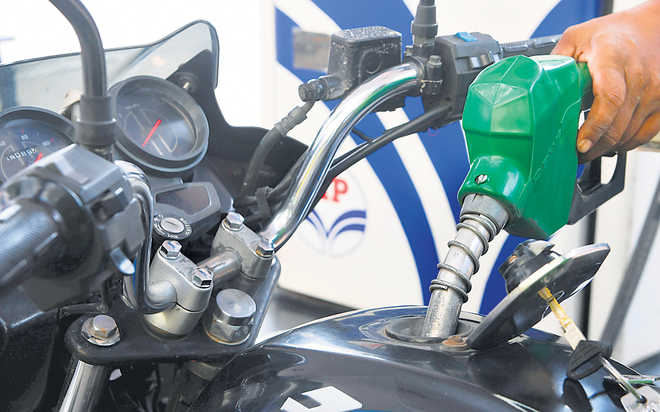
Worrisome: Rising oil prices. AFP
N Chandra Mohan
Economic and business commentator
With international oil prices surging to $77 a barrel and expected to remain high and volatile in the future, their impact is bound to be serious for countries like India that imports 82 per cent of its requirements. A further spike in prices is imminent, with the US walking out of the Iran nuclear deal that only aggravates geopolitical tensions in West Asia. Prices may even zoom to $100 or more due to the “fear premium”. Such an oil shock threatens the world economy with the prospect of sharply lower growth, if not recession, and higher inflation like in the 1970s.
The prospect of US-led sanctions on Iran will definitely constrain the latter’s crude exports. The supply of global oil is already tight with Venezuela’s production free-falling and the decision of leading producers like Saudi Arabia and Russia to curb output. Tighter supply spells higher prices as oil consumption by the faster growing economies like India and China is rising. Although US’oil production can take care of growth in demand, there are logistical constraints in ensuring that it reaches the markets. As if all of this weren’t bad enough, geopolitical risks add to the jitters of the global oil market.
How costlier oil will hit India
For India, costlier oil implies a higher import bill and inflation. According to the latest Economic Survey, every increase in global oil prices by $10 barrel raises the current account deficit — that is the broadest measure of the country’s trade imbalance — by $9 to 10 billion. Last year, this deficit touched $50 billion or 1.9 per cent of the nation’s output of goods and services or GDP. With higher oil prices this year, it may touch a projected $75 billion or 2.6 per cent of GDP – that is close to the 3 per cent threshold that signals greater vulnerability in India’s macroeconomic fundamentals.
Why is this a problem? A wider current account deficit per se should not occasion policy serious concern if it can be financed by capital inflows like foreign direct investments and portfolio investments. The bad news is that such an outcome is not in prospect as foreign investors are pulling out from emerging markets like India, thanks to prospects of higher interest rates in the world’s most powerful economy, the US. With portfolio investors making net sales $3.3 billion since last month, the exchange rate of the rupee is sinking, testing new lows of Rs 67.48 to a US dollar.
Rising oil prices also threaten India’s growth, which is expected to be 7-7.5 per cent this year. Much is being made of the fact that India has regained its status as the world’s fastest growing economy. But costlier oil threatens to take the shine off this achievement. Every $10 a barrel rise in prices lowers GDP growth by 0.2 to 0.3 percentage points. The upshot is a slower pace of expansion of an economy recovering from demonetisation and short-term disruption of the Goods and Services Tax. The impact of an oil shock at $100 a barrel can well be imagined.
How to counter the vulnerability
To reduce this vulnerability, efforts must be made to increase the levels of relative self-sufficiency by stepping up domestic oil and gas production. Unfortunately, this is not happening. There are serious shortfalls in oil production due to declining output from old and marginal fields. The country lacks the technological capability to undertake deepwater exploration. There have been no major hydrocarbon discoveries of late either. The preferred strategy is to pick up stakes in foreign oilfields to enhance energy security. But with oil prices hitting record highs, stepping up domestic oil production must be prioritised at all costs.
Towards this end, state-owned oil majors must be able to generate internal resources to undertake exploration. The PSU oil marketing majors must be able to spend on upgrading their refineries and setting up infrastructure. Unfortunately, they will not be able to do if they bleed from politically determined oil prices. A more rational oil pricing mechanism no doubt is in place, but successive governments like the UPA and NDA have not resisted the temptation to interfere in pricing to insulate the middle class from inflation. This is especially observed ahead of important elections.
Although the average basket of oil prices that India imports rose by $3 barrel, the NDA government appears to be in no mood to raise prices at the pump since April 24, thanks to electoral compulsions ahead of Karnataka Assembly elections. Unfortunately, this freeze is unlikely to be temporary as there are other key elections ahead, including the national one sometime in early 2019. As global oil prices are expected to remain at elevated levels, not allowing a “pass-through” to domestic retail prices lowers marketing margins and impacts the financial health of the oil majors.
True to form, the NDA regime denies that it has had any hand in keeping a lid on oil prices since it freed up the retail market in 2014. But that does not sound credible. Among other things, allowing a more rational oil pricing mechanism to work is crucial to stepping up efforts to raise domestic oil production and lowering import-dependence. Higher prices trigger the need for greater conservation and greater efficiency in the utilisation of oil. What makes for good politics doesn’t necessarily make for good economics. In any case, the relief is only short-lived if global oil prices keep climbing relentlessly, adversely impacting the economy.



























